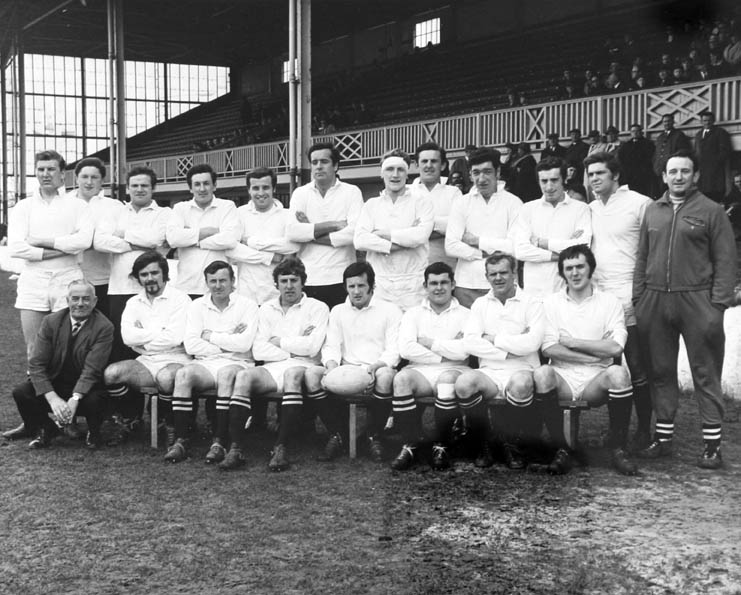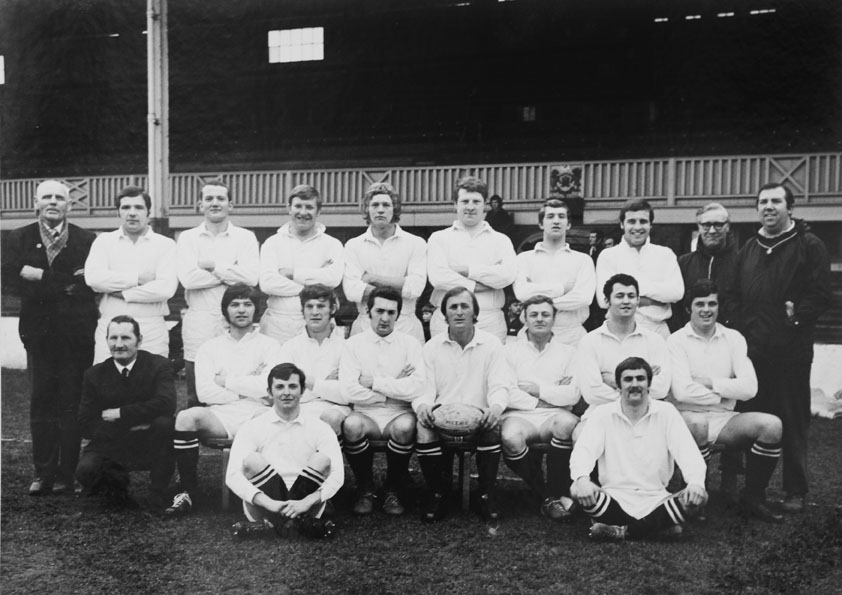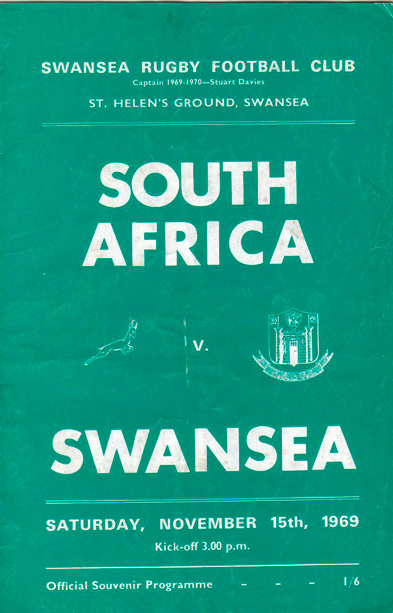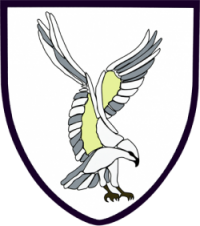| P | W | D | L | Pts. For | Pts. Ag. | T | P | D | C |
| 52 | 17 | 3 | 32* | 579 | 685 | 107 | 49 | 5 | 48 |
CAPTAIN : STUART DAVIES
MOST APPEARANCES : 43 (PHIL LLEWELLYN)
MOST TRIES : 21 (STUART DAVIES)
MOST POINTS : 107 (STUART FERGUSON)
NO WALES CAPS DURING SEASON
Wales ‘B’ v France ‘B’ : Roy Thomas
* Record number of losses during a season

Back Row (L to R):
Roger Hyndman, Gareth Rees, Clive Dyer, David Morgan, David Winslett, John Joseph, Phil Llewellyn, Mike James, Malcolm Henwood, Geoff Atherton, Mel. James, Jim Trott(Trainer).
Front Row(L to R): Eddie Rickard(Asst.Trainer), John Evans, Ray Jones, John Davies, Stuart Davies(Captain), Arwel Morgan, Riy Thomas, Roger Blyth.
Image restoration by David Dow at Dragon Tales Rugby 2006.
www.dragontalesrugby.com
Swansea RFC 1st XV 1969-70 Season.
Back Row (L to R):Roger Hyndman, Gareth Rees, Clive Dyer, David Morgan, David Winslett, John Joseph, Phil Llewellyn, Mike James, Malcolm Henwood, Geoff Atherton, Mel. James, Jim Trott(Trainer).
Front Row(L to R): Eddie Rickard(Asst.Trainer), John Evans, Ray Jones, John Davies, Stuart Davies(Captain), Arwel Morgan, Riy Thomas, Roger Blyth. (Club Archive).

Played: 32, Won: 18, Drawn: 0, Lost: 14. Points For: 393, Against: 301.
Back Row(L to R): J Williams, Peter Thomas, Ray Williams, David Lee, Robert Sandry, J W Dawes, Terry Greenslade, David Winslett, Ray Fuge (Trainer), Gareth John (Com.).
2nd Row(L to R): Bernard Cajot (Com.), Ian Tyrell, Stuart Clark, John Evans, Russell Jones (Captain), Terry Morgan, Brynmor Grey, Huw Morgan.
Front Row(L to R): Roy Probert, Jeffrey Davies.
Image restoration by David Dow at Dragon Tales Rugby.
www.dragontalesrugby.com
Swansea Athletic XV 1969-70 Season
Played: 32, Won: 18, Drawn: 0, Lost: 14. Points For: 393, Against: 301.
Back Row(L to R): J Williams, Peter Thomas, Ray Williams, David Lee, Robert Sandry, J W Dawes, Terry Greenslade, David Winslett, Ray Fuge (Trainer), Gareth John (Com.).
2nd Row(L to R): Bernard Cajot (Com.), Ian Tyrell, Stuart Clark, John Evans, Russell Jones (Captain), Terry Morgan, Brynmor Grey, Huw Morgan.
Front Row(L to R): Roy Probert, Jeffrey Davies. (Club Archive).

Match day programme Swansea v South Africa 15 Nov. 1969 at St Helens (Club Archive).
On 15th November 1969 Swansea hosted the 6th South African tourists at St Helens in a game marred by public disorder caused by Anti-Apartheid protestors. The game was won by South Africa by 12 points to nil. The Swansea team on that day were: S Ferguson, J Davies, D M Morgan, S Davies (captain), L Jones, H Bowen, T Pullman, A Rutherford, R Thomas, D Bowen, M James, J Joseph, C Dyer, M Henwood and D Winslett.
The article below was kindly submitted by Stuart Davies, former player and Club Captain of The Whites in 1969-70. Stuart Captained the Swansea side who played South Africa at St Helens in 1969 and these are his reminiscences of the historic occasion.
Swansea 0 v South Africa 12
November 15th 1969
The match played at St. Helens on November 15th 1969 made news bulletins around the world, regrettably, not for the rugby that was played but for the massive anti-apartheid protest that took place that day.
South Africa’s evil apartheid regime was increasingly being criticised and following the D’Oliveira affair in cricket, the sporting arena was becoming the focal point for demonstrations. The match was the first major Saturday fixture of the tour and Swansea’s accessibility by road and rail promised to attract many demonstrators.
It would be true to say that I, as captain, the rest of the team, the club and indeed rugby in general chose to ignore the moral issue, a stance which my daughters would not be happy with, if it happened today!
At that time, I worked for the local authority in the Guildhall and two things happened on the Friday before the match. A group of fellow employees, led by the former Swans player Billy Carroll, burst into the drawing office where I worked pretending to be militant students out to kidnap the Swansea captain to gain more publicity for their cause!
Laughter at those who had dressed up for the part gave the game away and I escaped intact!
Later that afternoon several of the Springbok party visited the Brangwyn Hall and I was invited to be there as well. They had come to see the Brangwyn panels and their captain, Dawie de Villiers explained to me that they were indeed world famous works of art, a fact of which I was blissfully unaware at the time. I look at them differently now on the many occasions that I attend concerts at the venue.
Dawie de Villiers was an icon in South Africa and following his retirement he entered the world of politics, becoming his country’s ambassador to the United Kingdom, then serving as a minister in their cabinet and later, becoming the Head of the World Tourism Organisation.
The day itself was obviously marred by the demonstrations culminating in a pitch invasion. During the course of the day, some 70 people were arrested and over 100 people were injured, including 10 police officers. There was an eerie feeling on the field throughout the match which affected us all and it would be true to say that the Springboks were saddened by the experience.
I remember very little about the game itself but one humorous incident in the build up to taking the field sticks out in my mind. We had for the first time ever arranged to meet for an early light lunch in the clubhouse. We then walked acrosss the field, deposited our kit in the dressing room and went for a walk on the beach. We turned around at Sketty Lane and by the time we arrived back we could hear a lot of noise coming from the Guildhall area where the demonstrators were holding a rally. Morrie Evans, the coach, and I were glad to usher the players into the dressing room where, with a background of increasing chanting noise from the demonstrators now gathering and parading in Mumbles Road, we spent the next hour or so trying to keep the players calm whilst focussing on the task ahead. We had emptied the dressing room of all but the players and had convinced ourselves and them that the noise and the crowd were nothing really. Everyone was sitting in total silence when the dressing room door was flung open to reveal the infamous Tommy Clement, the long serving team bus driver. He took one look at the silent gathering before uttering the immortal words – “They are going f……. mad out there!” Despite the increasing tension, we all had to laugh.
Our team that day was reflective of the unsettled nature of our season when we won only 17 out of 52 games played. The half backs, Hylton Bowen and Tom Pullman were from Mountain Ash and were playing only their third game for the club. Others like Lyndon Jones, David Morgan, John Joseph and Malcolm Henwood were all newcomers who had played very little for the club and indeed, by the end of the season only half of the team that played that day were still at St. Helens. Although a team photograph was taken before the game, no copies were distributed to the players, so regrettably we have no record of that memorable day. Recent efforts to locate the original have failed, so anyone with any knowledge of the existence of a copy would make several sixty-somethings extremely happy in their comparative dotage. Our only memento of the day was a pair of stockings, as the then normal practice of keeping the plain white kit for club use continued until the early eighties.
The team rose to the occasion in what was an uninspiring spectacle and restricted the powerful Springboks to just one try and no points at all in the second half. The one real memory I have of the match itself was the audible gasp from the crowd in the stand when the gargantuan figure of Mof Myburgh the Springbok prop took the field as a replacement for the injured Martin Van Rensburg. It was an awesome sight and certainly sent shivers down the backs of our young team.
The headlines over the next few days were regrettably all about the violence off the field and the knock on effects of the trouble. I was surprised on the Sunday morning to receive calls from the news desks of the leading newspapers seeking our reaction to the events of the day before, my views on apartheid and what we should do now as a rugby community. It would have been much better to have been talking about a wonderful match.
Despite everything, we were all very proud to represent a great club which continues to be, for many of us, a large part of our lives some 40 years later.
Many thanks to Stuart Davies for this original insight into a famous moment in the life and times of Swansea RFC from a participant in that match.
